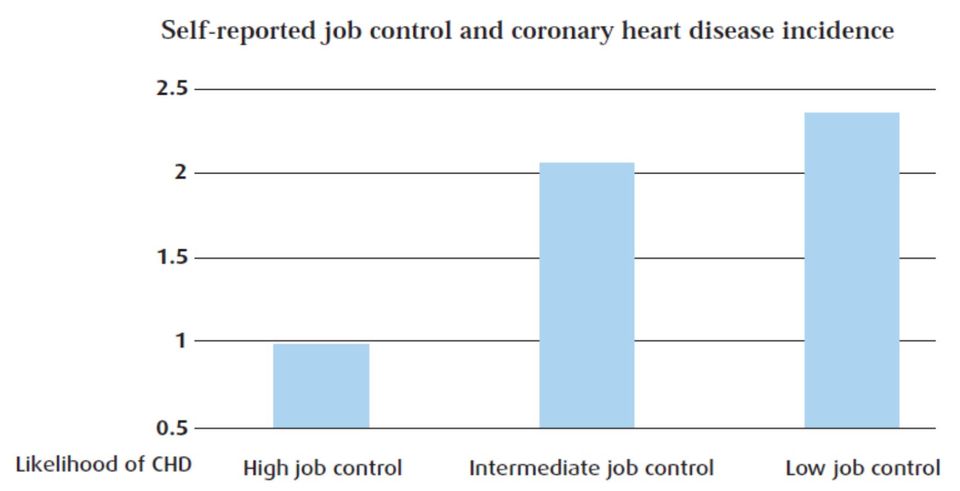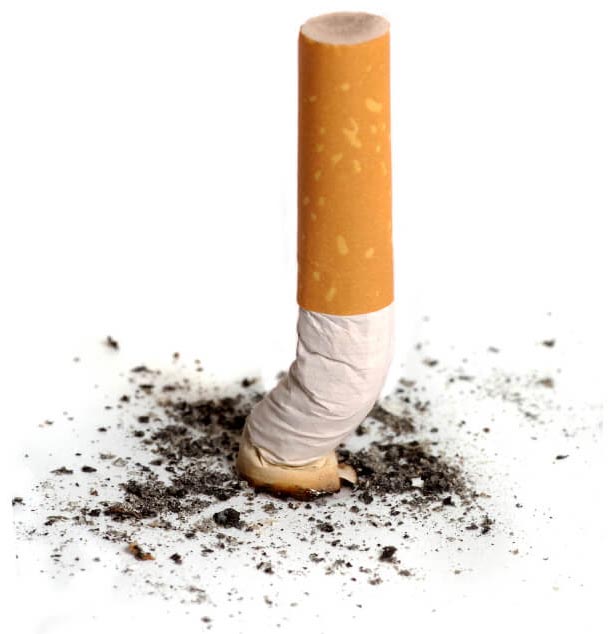Stress and Illness
| Introduction
|
Stressed From the Inside |
Stressed-Out Society |
Multiple Stresses |
The Way Forward
^ Introduction
Mental health clearly goes hand in hand with stress, yet increasingly we're seeing a profound connection between physical
health and stress. Take the
Whitehall Studies
that tracked the health of thousands of British civil servants.

These studies looked at two workplace stressors (unfair treatment at work, and lack of control over one’s job), and showed how these went hand in hand with an increased risk of depression, but also of some cancers, back pain and coronary heart disease (see the graph above).
^ Stressed From the Inside
Studies such as the one above bring home the potentially fatal nature of external stress. Yet of course stress comes not only from the outside, in things like stressful jobs. While our outer circumstances can be hard to control, what we can always profit from is to take ownership ofthe one domain we really can be assured of owning: our mind.
Therefore, perhaps the most important step we can all take in helping a stressful relationship, for example, is to resign our own part in making stress worse - by addressing the likes of the fear
and anger
in our head that escalate our stress (as where fear
keeps us intimidated and anger
keeps us furious.
Being "beside ourselves with rage" might give us the sense of being strong, yet of course anger
makes us only power-less witnesses to our own subjugation to a "stress force" that is not
us, and that merely uses
us as its conduit.

One study showed that being stressed out of our mind by anger - such as to become an unconscious blamer of blame objects and scapegoats - was associated with a 31% hike in coronary heart disease risk. The same study found that those who stayed calm and constructive even in the thick of heated disputes actually enjoyed a lowering of their risk of coronary heart disease.
^ Stressed-Out Society
While anger and fear are already well established as causes of stress, desire is not. Yet desire can, of course, escalate to the point of greed, compulsion and addiction. A very good case can be made for another "stress force" just as destructive as fear
and anger, even if one that pulls us in a different direction: compulsive desire.
The compulsion to possess power and status, and perch ourselves higher and higher above our neighbour, while claiming an ever greater share of the spoils, brings devastation to the community - as exposed by the Whitehall Studies (see above).
By this means, extreme division stressed out the human tribe - and all courtesy of compulsive desire, a "stress force" that lords it over usjust as
fear and
anger do. (All of this happens unconsciously, as explored here.)
Despite all the hype, here, the direction of travel is towards not greater "civilisation", but towards human poverty.
The everyday name for hierarchy "pecking order" highlights the chicken-like nature of obediently separating out by rank. Among primates, meanwhile, we see a very human-like grabbing after status - regardless of the consequence to others. Among baboons, for example, "alpha males"rule the roost and serve as top dog through stamping their authority through displays of aggression and through fighting off any challenger.
Here's the connection with stress: cortisol (stress hormone) measurements in baboons show that lower status goes with greater stress. Just for good measure, high-status baboons deal their low-status, "loser" counterparts a continual stream of bites and other humiliations, to keep them propping up the bottom of the hierarchy.

If "alpha male" status is a kind of trophy we can be stressed into fighting over, then we covet it because of being duped - by stress biology. More particularly, the "stress force" of compulsive desire
- that can end up deciding our interests - makes us see money and status through "rose-tinted spectacles".
Compulsive desire it is that drives our insatiable quest for fashion brands, sports cars, millionaire yachts etc., all the while that it distracts us from such real
treasures as love, joy and imagination.
Those left behind in the race to "get ahead" are left to share the fate of low-status baboons, that have been shown to share similar brain and hormone changes as those of depressed humans.
Here, we see the same link between low status and depression as has been observed in the Whitehall studies.
^ Multiple Stresses
That stress can operate on multiple levels is highlighted also in the Copenhagen City Heart Study. This showed that high levels of stress can make a healthy lifestyle harder to attain - by making us less likely to succeed with measures like quitting a smoking habit, limiting our alcohol intake, or staying physically active.

This is yet another example of how some huge public health concern can only be effectively addressed by tackling our stress.
^ The Way Forward
For our health to be truly championed - at the level of both the individual and the community - we need more effective means of containing our stress.
One possible approach is outlined in this website - and in the accompanying book.
In a nutshell, the work described is that of taking back the initiative through knowledge and awareness of fear
and its fellow "stress forces" - starting with their presence within our own self.
Click here for more
Find out about the "Four Steps To Freedom from Stress"
[Nb this website is not a replacement for professional help where needed.]
